Search Images
Browse Content (p. 1574)
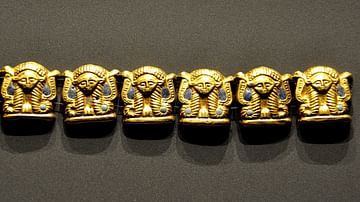
Image
Chain with Hathor Heads
Golden chain links in the shape of Hathor heads. From the treasure of the Nubian queen Amanishakheto, pyramid N6, Meroe, modern-day northern Sudan. Meroitic period, around 1 CE. (State Museum of Egyptian Art, Munich, Germany).
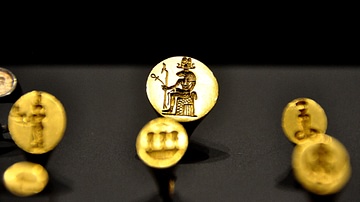
Image
Seal Rings from Meroe
Several golden seal rings with different gods; the focus is on one ring only. From the treasure of the Nubian queen Amanishakheto, pyramid N6, Meroe, modern-day northern Sudan. Meroitic period, around 1 CE. (State Museum of Egyptian Art...
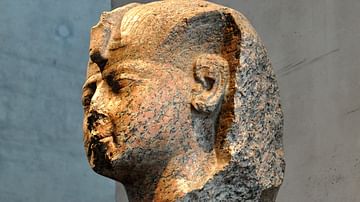
Image
Head of Hatshepsut
Rose granite head of the statue of queen Hatshepsut. She wears the royal headdress and was depicted as a pharaoh. From modern-day Egypt. New Kingdom, 18th Dynasty, circa 1460 BCE. (State Museum of Egyptian Art, Munich, Germany).
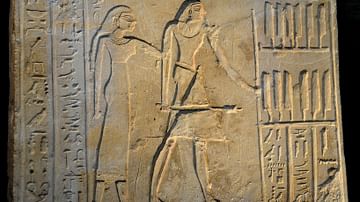
Image
Rehu and His Wife
Limestone tomb stela of Rehu and his wife. From Gebelein, modern-day Egypt. circa 1250 BCE.(State Museum of Egyptian Art, Munich, Germany).
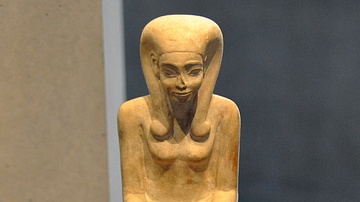
Image
Statue of Senet-iatju
Limestone statue of the seated figure of Senet-iatju. From modern-day Egypt. Circa 1600 BCE. (State Museum of Egyptian Art, Munich, Germany).

Image
Stela of Usekhu
Limestone stela of Usekhu, the overseer of the cabinet. From Abydos, modern-day Egypt. Middle Kingdom, circa 11th to 12th Dynasty, circa 2000 BCE. (State Museum of Egyptian Art, Munich, Germany).
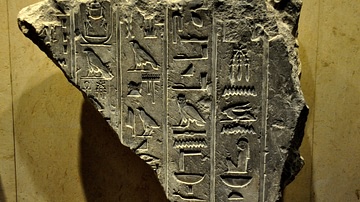
Image
Pharaoh Senusret I
Limestone fragment of an inscription which mentions the name of the Egyptian pharaoh Senusret I (aka Sesostris I). From Saqqara (Sakkara), modern-day Egypt. Middle Kingdom, 12th Dynasty, circa 1950 BCE. (State Museum of Egyptian Art, Munich...
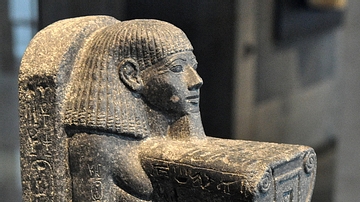
Image
Senenmut and Hathor
Granite statue of the kneeling figure of the architect Senenmut (also written Senmut or Senmout). He holds a symbol of the goddess Hathor. From Armant (ancient Hermonthis), modern-day Egypt. New Kingdom, 18th Dynasty, circa 1470 BCE. (State...
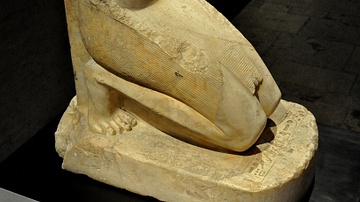
Image
Statue of Thutmose III
Only the lower half of this calcite kneeling figure of the Egyptian pharaoh Thutmose III has survived. From Karnak, modern-day Egypt. New Kingdom, 18th Dynasty, circa 1450 BCE. (State Museum of Egyptian Art, Munich, Germany).
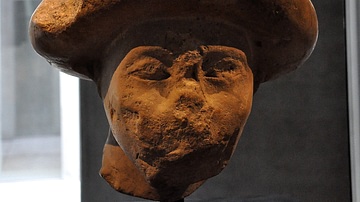
Image
Asiatic Figure Statue from Ancient Egypt
Limestone head from a statue of an Asiatic official. From modern-day Egypt. Middle Kingdom, 12th to 13th Dynasties, 1800-1750 BCE. (State Museum of Egyptian Art, Munich, Germany).